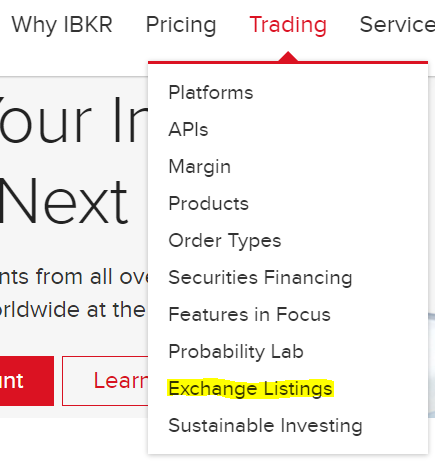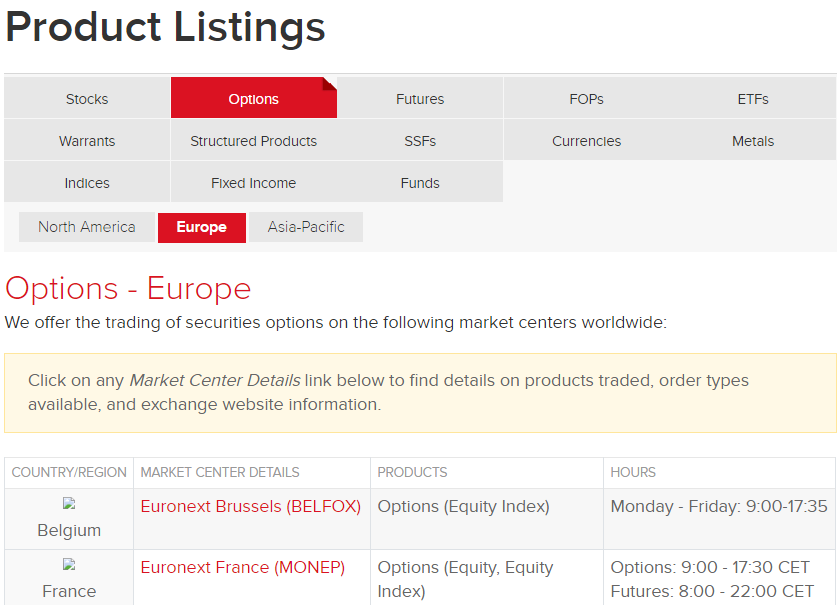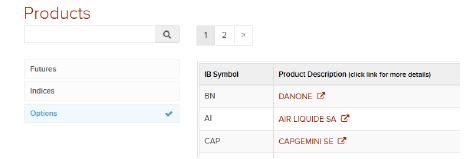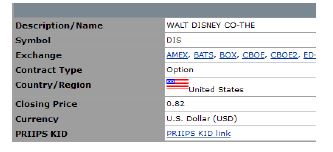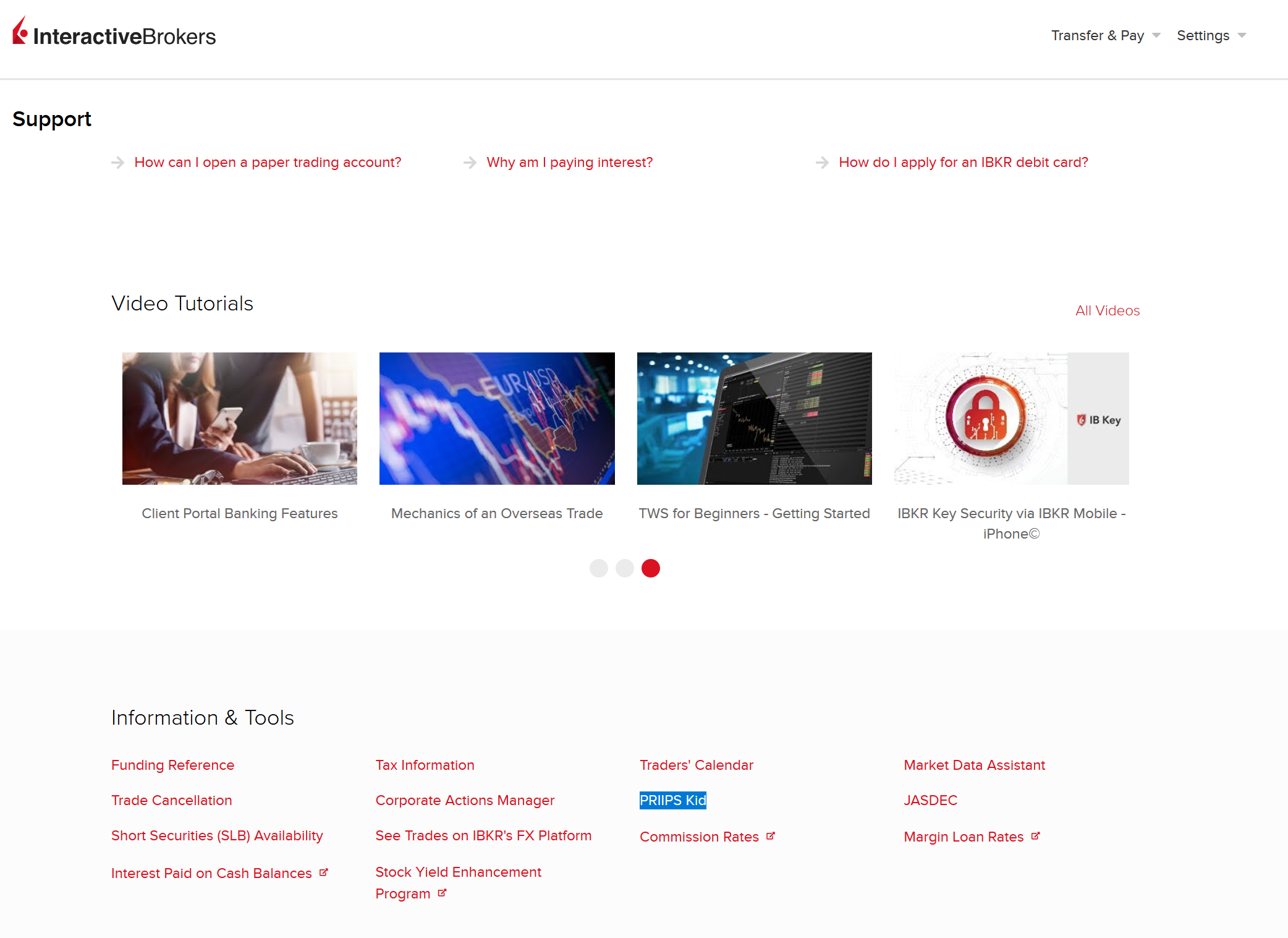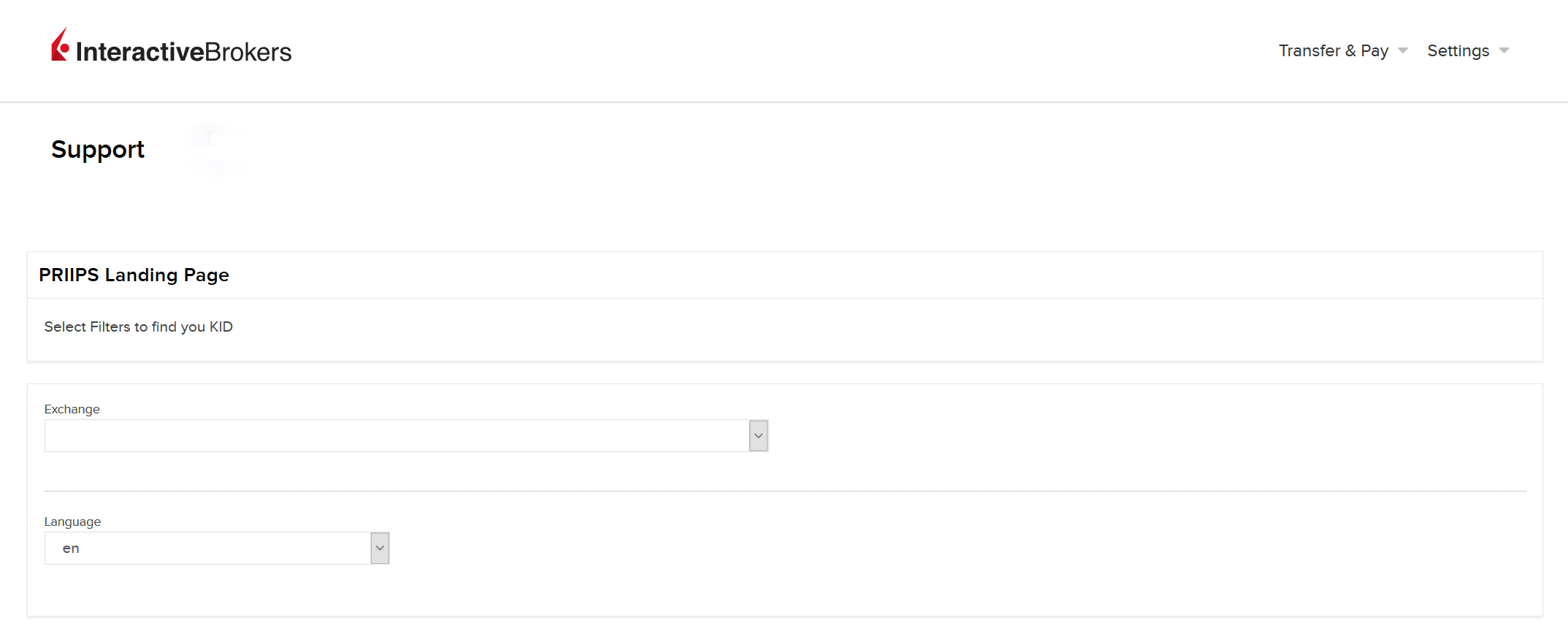Interactive Brokers (U.K.) Limited – MiFID Categorisation
Introduction
The European Union legislative act known as the Markets in Financial Instruments Directive, or MiFID, as amended by MiFID II, requires Interactive Brokers (U.K.) Limited (IBUK) to classify each Client according to their knowledge, experience and expertise: "Retail", "Professional" or "Eligible Counterparty".
In accordance with the Financial Conduct Authority rules, IBUK categorises most clients as Retail clients, providing them with a higher degree of protection.
Only those clients that are either regulated entities or funds managed by regulated fund managers, are categorised as Per Se Professional Clients.
Professional Clients are entitled to a lower degree of protection under the UK regulatory regimes than Retail Clients. This notice contains, for information purposes only, a summary of the protections that a Retail Client might lose if they are to be treated as a Professional Client.
1. Description of the nature and risks of packaged investments: A firm that offers an investment service with another service or product or as a condition of the same agreement with a Retail Client must: (i) inform Retail Clients if the risks resulting from the agreement are likely to be different from the risks associated with the components when taken separately; and (ii) provide Retail Clients with an adequate description of the different components of the agreement and the way in which its interaction modifies the risks. The above requirements do not apply in respect of Professional Clients. However, IBUK will not make such differentiation apart from the case specified under point 3 below.
2. Retail investor protection measures on the provision of Contracts for Differences (“CFDs”): The regulatory measures include: (i) Leverage limits on the opening of a position, which vary according to the volatility of the underlying; (ii) A margin close out rule on a per account basis that standardises the percentage of margin (at 50%of the minimum required margin) at which providers are required to close out one or more open CFDs; (iii) Negative balance protection on a per account basis;(iv) A restriction on the incentives offered to trade CFDs; and (v) A standardised risk warning, including the percentage of losses on a CFD provider’s Retail investor accounts. These measures do not apply in respect of Professional Clients.
3. Communication with clients, including financial promotions: A firm must ensure that its communications with all clients are, and remain, fair, clear and not misleading. However, the simplicity and frequency in which a firm may communicate with Professional Clients (about itself, its services and products, and its remuneration) may be different to the way in which the firm communicates with Retail Clients. Regulations relating to restrictions on, and the required contents of, direct offer financial promotions do not apply to promotions to Professional Clients and such promotions need not contain sufficient information for Professional Clients to make an informed assessment of the investment to which they relate. A firm’s obligations in respect of the level of details, medium and timing of the provision of information are different depending on whether the client is a Retailor Professional Client. The requirements to deliver certain product-specific documents, such as Key Information Documents (“KIDs”) for Packaged Retail and Insurance-based Investment Products (“PRIIPs”), are not applied to Professional Clients.
4. Depreciation in value reporting to clients: A firm that holds a Retail Client account that includes positions in leveraged financial instruments or contingent liability transactions must inform the Retail Client, where the initial value of each instrument depreciates by 10 per cent and thereafter at multiples of 10 per cent. The above reporting requirements do not apply in respect of Professional Clients (i.e., these reports do not have to be produced for Professional Clients).
5. Appropriateness: For transactions where a firm does not provide the client with investment advice or discretionary management services (such as an execution-only trade), it may be required to assess whether the transaction is appropriate. When assessing appropriateness for non-advised services, a firm may be required to determine whether the client has the necessary experience and knowledge in order to understand the risks involved in relation to the product or service offered or demanded. Where such an appropriateness assessment requirement applies in respect of a Retail Client, there is a specified test for ascertaining whether the client has the requisite investment knowledge and experience to understand the risks associated with the relevant transaction. However, in respect of a Professional Client the firm is entitled to assume that a Professional Client has the necessary level of experience, knowledge and expertise in order to understand the risks involved in relation to those particular investment services or transactions, or types of transaction or product, for which the client is classified as a Professional Client. IBUK provides non-advised services and is not required to request information or adhere to the assessment procedures for a Professional Client when assessing the appropriateness of a given service or product as with a Retail Client, and IBUK may not be required to give warnings to the Professional Client if it cannot determine appropriateness with respect to a given service or product.
6. Information about costs and associated charges: A firm must provide clients with information on costs and associated charges for its services and/or products. The information provided may not be as comprehensive for Professional Clients as it must be for Retail Clients.
7. Dealing: When undertaking transactions for Retail Clients, the total consideration, representing the price of the financial instrument and the costs relating to execution, should be the overriding factor in any execution. For Professional Clients a range of factors may be considered in order to achieve best execution –price is an important factor, but the relative importance of other different factors, such as speed, costs and fees may vary. However, IBUK will not make such differentiation.
8. Difficulty in carrying out orders: In relation to order execution, firms must inform Retail Clients about any material difficulty relevant to the proper carrying out of orders promptly on becoming aware of the difficulty. This is not required in respect of Professional Clients. The timeframe for providing confirmation that an order has been carried out is more rigorous for Retail Clients’ orders than Professional Clients’ orders.
9. Share trading obligation: In respect of shares admitted to trading on a regulated market or traded on a trading venue, the firm may, in relation to the investments of Retail Clients, only arrange for such trades to be carried out on a regulated market, a multilateral trading facility, a systematic internaliser or a third-country trading venue. This is a restriction which may not apply in respect of trading carried out for Professional Clients (i.e., this restriction can be disapplied where trades in such shares are carried out for Professional Clients in certain circumstances).
10. Exclusion of liability: Firms’ ability to exclude or restrict any duty or liability owed to clients is narrower under the FCA rules in the case of Retail Clients than in respect of Professional Clients.
11. The Financial Services Ombudsman: The services of the Financial Ombudsman Service in the UK may not be avail-able to Professional Clients, unless they are, for example, consumers, small businesses or individuals acting outside of their trade, business, craft or profession.
12. Compensation: IBUK is a member of the UK Financial Services Compensation Scheme. You may be entitled to claim compensation from that scheme if IBUK cannot meet its obligations to you. This will depend on the type of business and the circumstances of the claim; compensation is only available for certain types of claimants and claims in respect of certain types of business. Eligibility for compensation from the Financial Services Compensation Scheme is not contingent on your categorisation but on how the firm is constituted. Eligibility for compensation from the scheme is determined under the rules applicable to the scheme (more information is available at https://www.fscs.org.uk/).
13. Transfer of financial collateral arrangements: As a Professional Client, the firm may conclude title transfer financial collateral arrangements with you for the purpose of securing or covering your present or future, actual or contingent or prospective obligations, which would not be possible for Retail Clients.
14. Client money: The requirements under the client money rules in the FCA Handbook (CASS) are more prescriptive and provide more protection in respect of Retail Clients than in respect of Professional Clients.
Re-categorisation as Professional Client
IBUK allows its Retail Clients to request to be re-categorised as Professional Clients. Clients are notified of their Client Category and can check it at any time from Account Management, under Settings> Account Settings> MiFID Client Category. From this same screen, Clients can also request to change their MiFID Category.
IBUK will consider re-categorising Retail Clients to Professional Clients in two instances:
1. Per Se Professional Clients can notify IBUK that they consider that they should have been categorised as Per Se Professionals under the FCA rules, because at least one of the following conditions applies:
(i) authorised or regulated to operate in the financial markets; or
(ii) a large undertaking meeting two of the following size requirements on a company basis:
(a) balance sheet total of EUR 20,000,000;
(b) net turnover of EUR 40,000,000;
(c) own funds of EUR 2,000,000;
(iii) an institutional investor whose main activity is to invest in financial instruments. This includes entities dedicated to the securitisation of assets or other financing transactions.
2. IBUK may treat Clients as Elective Professional Clients if, based on an assessment of the Client’s expertise, experience, and knowledge, IBUK is reasonably assured that, in light of the nature of the transactions or services envisaged, the Client is capable of making its own investment decisions and understand the risks involved. Clients who do not meet the requirements to be categorised as Per Se Professional Clients can still request to be categorised as Elective Professional Clients.
To obtain such re-categorisation, Retail Clients must provide evidence that they satisfy at least two (2) of the following criteria:
1. Over the last four (4) quarters, the Client conducted trades in financial instruments in significant size at an average frequency of ten (10) per quarter.
To determine the significant size IBUK considers the following:
a. During the last four quarters, there were at least forty (40) trades; and
b. During each of the last four (4) quarters, there was at least one (1) trade; and
c. The total notional value of the top forty (40) trades of the last four (4) quarters is greater than EUR 200,000; and
d. The account has a net asset value greater than EUR 50,000.
Trades in Spot FX and Unallocated OTC Metals are not considered for the purpose of this calculation.
2. The Client holds a portfolio of financial instruments (including cash) that exceeds EUR 500,000 (or equivalent);
3. The Client is an individual account holder or a trader of an organisation account who works or has worked in the financial sector for at least one year in a professional position which requires knowledge of products it trades in.
Upon review and verification of the information and supporting evidence provided, IBUK will re-categorise clients if all relevant conditions are met to satisfaction.
Retail Clients requesting to be re-categorised as Professional Accounts must read and understand the warning provided by IBUK before the relevant request is submitted.
Re-categorisation as Retail Client
Professional Clients can request IBUK to be re-categorised as Retail Clients, from the same Account Management page described above (under Settings> Account Settings> MiFID Client Category).
With the sole exception of regulated entities or funds managed by regulated fund managers, which are categorised as Per Se Professional Clients, IBUK accepts all such requests.
THIS INFORMATION IS GUIDANCE FOR INTERACTIVE BROKERS FULLY DISCLOSED CLEARED CUSTOMERS ONLY.
NOTE: THE INFORMATION ABOVE IS NOT INTENDED TO BE A COMPREHENSIVE, EXHAUSTIVE NOR A DEFINITIVE INTERPRETATION OF THE REGULATION, BUT A SUMMARY OF IBUK’S APPROACH TO CLIENT CATEGORISATION AND RE-CATEGORISATION POLICY.
Information Regarding Australian Regulatory Status Under IBKR Australia
Introduction
Australian resident customers maintaining an account with Interactive Brokers Australia Pty Ltd (IBKR
Australia), which holds an Australian Financial Services License, number 453554, are initially
classified as a retail investor, unless they satisfy one or more of the requirements to be classified as a
wholesale or professional investor according to the relevant provisions of the Corporations Act 2001.
This article outlines how this process is handled by IBKR Australia.
Australian Regulatory Status
All new customers of IBKR Australia default to being classified as a retail investor unless they produce to
IBKR Australia the required documentary evidence to allow IBKR Australia to treat them as a wholesale or
professional investor. Investors of IBKR Australia will only have their regulatory status change from
retail investor to either wholesale or professional investor subsequent to the required
documentation being received and approved by IBKR Australia.
What is a Wholesale Investor?
The most common way to be classified as a wholesale investor is to obtain a qualified accountant’s
certificate stating that you have net assets or net worth of at least $2.5 million AUD OR have a gross
annual income of at least $250,000 AUD in each of the last two financial years. The qualified
accountant’s certificate is only valid for two years before it needs to be renewed. We have prepared a
wholesale investor booklet, including a pro forma certificate for your accountant to complete, that
can be downloaded [here].
What is a Professional Investor?
In order to qualify as a professional investor, you must have an AFSL, be a body regulated by APRA, be a superannuation fund (but not a SMSF) and/or have net worth or liquid net worth of at least $10 million AUD. If you meet ONLY the financial criteria (i.e. net worth or liquid net worth of at least $10 million AUD), you will need to complete and submit to IBKR Australia the professional investor declaration contained within the professional investor booklet that we have prepared, which can be downloaded [here]. However, if you meet the criteria by virtue of having an AFSL, being a body regulated by APRA, or as a listed company (but not a SMSF), no booklet needs to be submitted.
What about Self-Managed Super Funds (SMSF’s)?
IBKR Australia have decided to treat all SMSF’s as retail investors, notwithstanding that they may meet the requirements to otherwise be classified as a wholesale or professional investor.
What about trusts?
For a trust to be considered as a wholesale investor, all trustees must be considered a wholesale
investor based on the tests described above.
Similarly, for a trust to be considered as a professional investor, all trustees must be considered a
professional investor based on the tests described above.
As a result, if at least one trustee is considered retail, the trust is considered a retail trust, regardless
of the status of any other trustees (if applicable).
Other
- For a full list of the disclosure documents and legal terms which govern the services IBKR Australia will make available please refer to the IBKR website.
- For further information on IBKR Australia, click on our Financial Services Guide.
- For more information or assistance, please contact IBKR Investor Services.
Restricciones de cámaras de compensación para valores de cannabis
Boerse Stuttgart y Clearstream Banking han anunciado que ya no proporcionarán servicios para emisiones cuyo negocio principal esté conectado directa o indirectamente con el cannabis y otros productos narcóticos. En consecuencia, estos valores ya no operarán en las bolsas de Stuttgart (SWB) o Frankfurt (FWB). Con efecto al cierre del 19 de septiembre de 2018, IBKR llevará a cabo las siguientes acciones:
- Cierre forzoso de todas las posiciones impactadas para las que los clientes no hayan actuado para cerrarlas y que no sean eligibles para transferencia a una cotización estadounidenses; y
- Transferencia forzosa a un mercado estadounidenses de todas las posiciones impactadas para las que los clientes no hayan actuado para cerrarlas y que sean eligibles para dicha transferencia.
En la tabla siguiente se indican las emisiones afectadas según han anunciado Boerse Stuttgart y Clearstream Banking a fecha del 7 de agosto de 2018. Esta tabla incluye una nota indicando si las emisiones afectadas son elegibles para transferencia a un mercado estadounidense. Tenga en cuenta que las cámaras de compensación han indicado que esta lista podría no estar completa y se aconseja a los clientes que revisen sus páginas web respectivas para la información más actualizada.
| ISIN | NOMBRE | MERCADO | ¿ELEGIBLE PARA TRANSFERENCIA EE.UU.? |
SÍMBOLO EE. UU. |
| CA00258G1037 |
ABATTIS BIOCEUTICALS CORP |
FWB2 | SÍ |
ATTBF |
| CA05156X1087 |
AURORA CANNABIS INC |
FWB2, SWB2 | SÍ |
ACBFF |
| CA37956B1013 |
GLOBAL CANNABIS APPLICATIONS |
FWB2 | SÍ |
FUAPF |
| US3988451072 |
GROOVE BOTANICALS INC |
FWB | SÍ |
GRVE |
| US45408X3089 |
INDIA GLOBALIZATION CAPITAL |
FWB2, SWB2 | SÍ |
ICG |
| CA4576371062 |
INMED PHARMACEUTICALS INC |
FWB2 | SÍ |
IMLFF |
| CA53224Y1043 |
LIFESTYLE DELIVERY SYSTEMS I |
FWB2, SWB2 | SÍ |
LDSYF |
| CA56575M1086 |
MARAPHARM VENTURES INC |
FWB2, SWB2 | SÍ |
MRPHF |
| CA5768081096 |
MATICA ENTERPRISES INC |
FWB2, SWB2 | SÍ |
MQPXF |
| CA62987D1087 |
NAMASTE TECHNOLOGIES INC |
FWB2, SWB2 | SÍ |
NXTTF |
| CA63902L1004 |
NATURALLY SPLENDID ENT LTD |
FWB2, SWB2 | SÍ |
NSPDF |
| CA88166Y1007 |
TETRA BIO-PHARMA INC |
FWB2 | SÍ |
TBPMF |
| CA92347A1066 |
VERITAS PHARMA INC |
FWB2 | SÍ |
VRTHF |
| CA1377991023 |
CANNTAB THERAPEUTICS LTD |
FWB2 | NO | |
| CA74737N1042 |
QUADRON CANNATECH CORP |
FWB2 | NO | |
| CA84730M1023 |
SPEAKEASY CANNABIS CLUB LTD |
FWB2, SWB2 | NO | |
| CA86860J1066 |
SUPREME CANNABIS CO INC/THE |
FWB2 | NO | |
| CA92858L2021 |
VODIS PHARMACEUTICALS INC |
FWB2 | NO |
NOTAS IMPORTANTES:
- Tenga en cuenta que las cotizaciones estadounidenses generalmente operan de forma extrabursátil (PINK) y están denominadas en USD, no EUR, lo cual le expone al riesgo de cambio de divisas, además del riesgo de mercado
- Los titulares de cuenta que mantengan valores PINK Sheet requieren permisos de negociación para Estados Unidos (Penny Stocks) para poder introducir órdenes de apertura.
- Todos los usuarios con cuentas que mantengan permisos de negociación para Estados Unidos (Penny Stocks) deben tener protección de 2 factores cuando se conecten a la cuenta.
Clearinghouse Restrictions on Cannabis Securities
Boerse Stuttgart and Clearstream Banking have announced that they will no longer provide services for issues whose main business is connected directly or indirectly to cannabis and other narcotics products. Consequently, those securities will no longer trade on the Stuttgart (SWB) or Frankfurt (FWB) stock exchanges. Effective as of the 19 September 2018 close, IBKR will take the following actions:
- Force close any impacted positions which clients have not acted to close and that are not eligible for transfer to a U.S. listing; and
- Force transfer to a U.S. listing any impacted positions which clients have not acted to close and that are eligible for such transfer.
Outlined in the table below are impacted issues as announced by the Boerse Stuttgart and Clearstream Banking as of 7 August 2018. This table includes a notation as to whether the impacted issue is eligible for transfer to a U.S. listing. Note that the clearinghouses have indicated that this list may not yet be complete and clients are advised to review their respective websites for the most current information.
| ISIN | NAME | EXCHANGE | U.S. TRANSFER ELIGIBLE? | U.S. SYMBOL |
| CA00258G1037 |
ABATTIS BIOCEUTICALS CORP |
FWB2 | YES |
ATTBF |
| CA05156X1087 |
AURORA CANNABIS INC |
FWB2, SWB2 | YES |
ACBFF |
| CA37956B1013 |
GLOBAL CANNABIS APPLICATIONS |
FWB2 | YES |
FUAPF |
| US3988451072 |
GROOVE BOTANICALS INC |
FWB | YES |
GRVE |
| US45408X3089 |
INDIA GLOBALIZATION CAPITAL |
FWB2, SWB2 | YES |
ICG |
| CA4576371062 |
INMED PHARMACEUTICALS INC |
FWB2 | YES |
IMLFF |
| CA53224Y1043 |
LIFESTYLE DELIVERY SYSTEMS I |
FWB2, SWB2 | YES |
LDSYF |
| CA56575M1086 |
MARAPHARM VENTURES INC |
FWB2, SWB2 | YES |
MRPHF |
| CA5768081096 |
MATICA ENTERPRISES INC |
FWB2, SWB2 | YES |
MQPXF |
| CA62987D1087 |
NAMASTE TECHNOLOGIES INC |
FWB2, SWB2 | YES |
NXTTF |
| CA63902L1004 |
NATURALLY SPLENDID ENT LTD |
FWB2, SWB2 | YES |
NSPDF |
| CA88166Y1007 |
TETRA BIO-PHARMA INC |
FWB2 | YES |
TBPMF |
| CA92347A1066 |
VERITAS PHARMA INC |
FWB2 | YES |
VRTHF |
| CA1377991023 |
CANNTAB THERAPEUTICS LTD |
FWB2 | NO | |
| CA74737N1042 |
QUADRON CANNATECH CORP |
FWB2 | NO | |
| CA84730M1023 |
SPEAKEASY CANNABIS CLUB LTD |
FWB2, SWB2 | NO | |
| CA86860J1066 |
SUPREME CANNABIS CO INC/THE |
FWB2 | NO | |
| CA92858L2021 |
VODIS PHARMACEUTICALS INC |
FWB2 | NO |
IMPORTANT NOTES:
- Note that the U.S. listings generally trade over-the-counter (PINK) and are denominated in USD not EUR thereby exposing you to exchange rate risk in addition to market risk.
- Account holders maintaining PINK Sheet securities require United States (Penny Stocks) trading permissions in order to enter opening orders.
- All users on accounts maintaining United States (Penny Stocks) trading permissions are required use 2 Factor login protection when logging into the account.
Reglamento relativo a los productos empaquetados o basados en seguros
El reglamento sobre los productos de inversión minoristas y los productos de inversión basados en seguros - UE No 1286/2014 (“Reglamento PRIIPs” o “PRIIPs” por sus siglas en inglés) entró en vigor el 29 de diciembre de 2014 y sus requisitos son aplicables desde el 1 de enero de 2018. El reglamento requiere que los productores de productos creen y mantengan documentos de datos fundamentales (KID por sus siglas en inglés) y que las personas que anuncien o vendan productos empaquetados o basados en seguros proporcionen a los inversores minoristas con base en el Espacio Económico Europeo (EEE) documentos de datos fundamentales para ofrecer a dichos inversores un mejor entendimiento y una mejor comparación de productos.
Los objetivos del reglamento de productos empaquetados o basados en seguros.
Desde la crisis financiera de 2008, uno de los objetivos principales de la Comisión Europea ha sido aumentar la protección de cliente y devolver la confianza a los mercados financieros.
El reglamento introduce un nuevo documento de datos fundamentales para mejorar el entendimiento del inversor minorista de los productos empaquetados o basados en seguros y la comparabilidad de tales productos. Un producto empaquetado o basado en seguros como cualquier inversión en la que la cantidad reembolsable al inversor está sujeta a fluctuaciones debido a la exposición a valores de referencia. Además de productos basados en seguros, algunos ejemplos de PRIIP son opciones, futuros, CFD, productos estructurados, etc.
El reglamento es una legislación de protección al inversión, cuyos objetivos principales son:
- Para asegurar el entendimiento y la comparabilidad entre productos similares para ayudar al inversor a tomar decisiones de inversión.
- Mejorar la transparencia y aumentar la confianza en el mercado de inversiones minorista.
- Promover un mercado de seguros europeo único.
El reglamento busca alcanzar estos objetivos mediante la definición de un formato y contenido estándar para los documentos de datos fundamentales.
¿Que es un documento de datos fundamentales?
El documento de datos fundamentales es un documento de 3 páginas que contiene detalles importantes del producto, que incluyen una descripción general, el coste, el perfil de riesgo y recompensa y posibles escenarios de rendimiento.
¿A quién se aplica este reglamento?
El reglamento se aplica tanto a productores como a distribuidores de productos empaquetados o basados en seguros. La responsabilidad de crear y mantener el documento recae sobre el productor del producto. Sin embargo, cualquier distribuidor o intermediario financiero que venda o proporcione asesoría sobre productos empaquetados o basados en seguros a un inversor minorista o que reciba una orden de compra de unos de estos productos por parte de un inversor minorista, debe proporcionar al inversor un documento de datos fundamentales. Esto también se aplica a entornos en línea de solo ejecución.
¿Quién debería recibir un documento de datos fundamentales (KID por sus siglas en inglés)?
Los inversores minoristas con domicilio en el EEE deberían recibir un documento de datos fundamentales antes de invertir en un producto empaquetado o basado en el riesgo. Si no hay un documento de datos fundamentales disponible desde el productor, el producto empaquetado o basado en seguros tendrá restringida la negociación para los clientes minoristas del EEE.
Implicaciones para Interactive Brokers:
Para cumplir con el reglamento para productos empaquetados o basados en seguros, cuando se requiera, IB UK proporcionará los documentos de datos fundamentales electrónicamente, a través de una página web (“PRIIPs KID Landing Page”).
¿Dónde puedo encontrar la PRIIPs KID Landing Page?
Los documentos de datos fundamentales (KID) pueden encontrarse desde nuestra página PRIIPs KID. Hay tres maneras para acceder a los documentos. Están disponibles a través de la Trader Workstation de IBKR (“TWS”), la página web de IBKR y Client Portal.
1. Encontrar documentos KID a través de TWS:
- Conéctese a TWS
- Haga clic en el símbolo del producto para el que desea el documento de datos fundamentales.
- Bajo la Información de Instrumentos Financieros, seleccione Detalles.
- Desde la página de Detalles de Contrato, puede seleccionar el enlace PRIIPs KID. Esto le llevará a la página PRIIPs KID Landing Page en Client Portal.
2. Encontrar documentos KID a través de la página web de IBKR:
- Abra la pestaña Negociación y seleccione Lista de mercados.
- A continuación, seleccione Lista de productos. Seleccione el tipo de derivado, la región y el mercado del producto para el que desearía encontrar la información de contrato.
- Seleccione el producto para el cual desearía ver el documento de datos fundamentales, que le llevará a la página de Detalles de Contrato.
- Desde la página Detalles de contrato, podrá seleccionar el enlace PRIIPs KID que le llevará a nuestra página PRIIPs KID Landing Page en Client Portal.
3. Encontrar documentos KID a través de Client Portal:
- Inicie sesión en Client Portal.
- Haga clic en el icono Ayuda (?) y, a continuación, en Centro de ayuda.
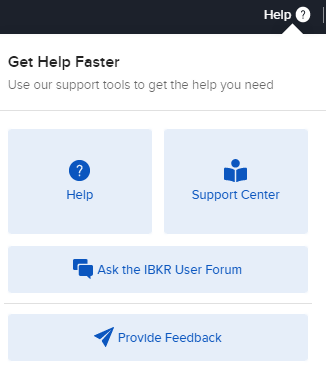
- En la sección Información y herramientas, seleccione PRIIPs Kid, que le llevará a nuestra página PRIIPs KID Landing Page.
Legal Entity Identifier Overview
BACKGROUND
The Legal Entity Identifier (LEI) is a 20-digit reference code that uniquely identifies legally distinct entities engaging in financial transactions globally, and across markets and jurisdictions. The LEI system was developed by the G-20 in accordance with ISO standards and the issuers of LEIs, referred to as Local Operating Units (LOU), supply registration and renewal services. Providing a unique identifier for each legal entity (along with key reference information associated with the entity) participating in financial transactions is intended to promote transparency.
DTC, in collaboration with SWIFT, operate as the local (U.S.) source provider of LEIs and maintains a website for the assignment of new and search of existing LEIs. See: http://www.gmeiutility.org/
SITUATIONS REQUIRING A LEI
In certain instances, brokers are required by regulation to report information regarding a client and include in that information a client identifier. For entities such as trusts and organizations, that identifier is referred to an a LEI. Examples of these reporting instances include the following:
CFTC Ownership and Control Reporting
MiFIR Transaction Reporting
China Stock Connect
EMIR reporting to trade repository
OBTAINING THE LEI
A LEI can be obtained by contacting an authorized LEI issuer, also referred to as a Local Operating Unit (LOU). The DTC, in collaboration with SWIFT, operates as a U.S. LOU and maintains a website for purposes of LEI registration and renewal. Note that LEI applicants can use the services of any accredited LOU and are not limited to using an LEI issuer in their own country.
In addition, as a service to its clients, IBKR will send an invite via Account Management to those who are required to obtain a LEI for trading or other regulatory reporting functions. Through this invite, the client can authorize IBKR to request an LEI through DTC on an accelerated basis (24 hours) and debit the client's account for the application fee and the annual renewal fee thereafter.
PRIIP Order Reject Translations
Clients entering opening orders for products covered by the PRIIPs Regulation where the issuer has not provided the required disclosure documents or Key Information Documents (KIDS) will have their order rejected and will receive the following reject message:
English
This product is currently unavailable to clients classified as 'retail clients'.
Note: Individual clients and entities that are not large institutions generally are classified as 'retail' clients.
There may be other products with similar economic characteristics that are available for you to trade.
French
Ce produit n’est pas actuellement disponible pour les clients considérés comme des clients “Particuliers/de détail”. Remarque : les clients particuliers et entreprises de détail qui ne sont pas de larges établissements sont classifiés comme des clients “de détail”.
D’autres produits aux caractéristiques similaires peuvent exister mais ne vous sont pas proposés au trading.
German
Dieses Produkt ist derzeit für Kunden, die als „Retail-Kunden” eingestuft werden, nicht verfügbar. Hinweis: Einzelkunden und Körperschaften, bei denen es sich nicht um große Institutionen handelt, werden grundsätzlich als „Retail”-Kunden bezeichnet.
Es ist möglich, dass Ihnen andere Produkte mit ähnlichen wirtschaftlichen Merkmalen zum Handel zur Verfügung stehen.
Italian
Questo prodotto al momento non è disponibile per i clienti “retail”. Nota: i clienti privati e le organizzazioni di non grandi dimensioni sono in genere classificati come clienti “retail”.
Potrebbero esserci altri prodotti con simili caratteristiche disponibili per le negoziazioni.
Spanish
Este producto no está actualmente disponible para clientes clasificados como “clientes minoristas”. Nota: los clientes individuales y las entidades que no sean grandes instituciones son clasificados, generalmente, como clientes “minoristas”.
Podría haber otros productos con características económicas similares que estén disponibles para que usted opere en ellos.
Russian
На данный момент этот продукт недоступен для розничных клиентов. Примечание: Частные лица и юридические структуры, не являющиеся крупными предприятиями, как правило, относятся к числу розничных клиентов.
Вам могут быть доступны другие продукты с похожими экономическими характеристиками.
Japanese
こちらの商品は現在「リテール・クライアント」として分類されるお客様にはご利用いただけません。注意:大きな機関ではない個人のお客様および事業体のお客様は、通常「リテール」クライアントとして分類されます。
似た経済特性を持つその他の商品で、お客様にお取引いただくことのできる商品がある可能性があります。
Chinese Simplified
该产品目前不适用于"零售客户"。 请注意:个人用户和非大型机构实体通常均被划分为"零售"客户。
可能有其他具有类似经济特征的产品适用于您的交易。
Chinese Traditional
該產品目前不適用於"零售客戶"。請注意: 個人用戶和非大型機構實體通常均被劃分為"零售"客戶。
可能有其他具有類似經濟特徵的產品適用於您的交易。
Please note, it is possible to be reclassified from Retail to Professional once certain qualitative, quantitative and procedural requirements are met. For more information on requirements, please see: How can I update my MiFID client category?
China Connect Northbound Investor ID Model
In November 2017, the Securities and Futures Commission (SFC) and China Securities Regulatory Commission (CSRC) announced an agreement to introduce an investor identification regime for Northbound trading under Mainland-Hong Kong Stock Connect. This regime is intended to enhance regulatory surveillance of mainland-listed stock trading from Hong Kong and requires brokers to report the identity of clients submitting orders to either the Shanghai or Shenzhen Stock Exchange. This regulation will be effective as of September 26, 2018. Additional information is provided in the series of FAQs below.
The Stock Connect is a collaboration between the Hong Kong, Shanghai and Shenzhen Stock Exchanges which allows international and Mainland Chinese investors to trade securities in each other's markets through the trading and clearing facilities of their home exchange.
Northbound trading refers to the trading of mainland-listed stocks (e.g., Shanghai and Shenzhen Stock Exchanges) from the Hong Kong Stock Exchange.
The information collected and reported depends upon the client classification. In the case of individuals, the information is as follows:
- Name in English and Chinese
- ID issuing country/jurisdiction
- ID type (Hong Kong ID card, ID card issued by the government authority of relevant country/region, passport, or any other official identity document e.g. driver's license)
- ID number (number of ID document)
- Entity name
- Other official incorporation documents (IBKR will attempt to us the documents clients provided at the point of account opening, whenever possible).
- Legal Entity Identifier (if you do not already have an LEI, you can order one through IBKR when requesting trading permissions for China Connect. Note that obtaining a LEI can take up to three days, is associated with an application fee imposed by the LEI issuing organization, and an annual renewal fee thereafter).
Clients who wish to access the Stock Connect must provide IBKR with consent to provide their information to the Hong Kong Exchanges and Clearing Ltd and the Chinese regulatory bodies such as:
- Shanghai and Shenzhen Stock Exchanges
- China Securities Depository and Clearing (Hong Kong) Company Limited
- Mainland regulatory authorities and law enforcement agencies
Clients with existing Northbound trading permissions will be presented with the online form upon log in to Client Portal. This form will allow IBKR to collect the required information and consent to submit this information upon order submission.
The Northbound Investor ID model will be effective as of October 22, 2018.
The SFC and the CSRC also agreed to introduce a similar investor identification regime for Southbound trading as soon as possible after the regime for Northbound trading is implemented.
Once the Northbound Investor ID model is in effect, clients who either fail to provide the required information or elect not to provide consent to report the required information will not be allowed to submit opening Northbound orders but will be allowed to close existing positions.
In order to trade China Connect stocks clients are required to login to Client Portal and request the necessary trading permissions. To do so:
- Log into Client Portal
- Click the User menu (head and shoulders icon in the top right corner) followed by Manage Account
- If you manage multiple accounts, select an account by clicking on the account number to popup the Account Selector
- Click the Configure (gear) icon next to Trading Experience & Permissions
- Click on "Stocks" and check the box next to "Hong Kong/China Stock Connect"
- Click CONTINUE and follow the prompts on screen.
China Connect - Disclosure Obligation and Foreign Shareholding Restriction
The following is a high-level summary of the disclosure obligations and foreign investors’ shareholding restriction applicable to the trading of Shanghai Stock Exchange (SSE) Securities or Shenzhen Stock Exchange (SZSE) Securities under Stock Connect.
Both Interactive Brokers, in its role as a China Connect Exchange Participant, and investors trading SSE/SZSE Securities through Interactive Brokers are required to comply with these requirements.
I. Disclosure Obligation
- When an investor holds or controls up to 5% of the issued shares of a Mainland listed company, the investor is required to report in writing to the China Securities Regulatory Commission (“CSRC”) and the relevant exchange, and inform the Mainland listed company within three working days of reaching 5%.
- The investor is not allowed to continue purchasing or selling shares in that Mainland listed company during the three day notification period.
- For such investor, whenever there is an increase or decrease in his shareholding that equals or exceeds 5% of the existing holdings, he is required to make disclosure within three working days of the change. From the day the disclosure obligation arises to two working days after the disclosure is made, the investor may not buy or sell the shares in the relevant Mainland listed company.
- If a change in shareholding of the investor is less than 5% but results in the shares held or controlled by him/her falling below 5% of the relevant Mainland listed company, the investor is required to disclose the information within three working days of the event.
II. Shareholding Restriction
- A single foreign investor’s shareholding in a Mainland listed company is not allowed to exceed 10% of the company’s total issued shares, while all foreign investors’ shareholding in the A shares of the listed company is not allowed to exceed 30% of its total issued shares.
- When the aggregate foreign shareholding of an individual A share reaches 26%, SSE or SZSE will publish a notice on its website.
- Once SSE or SZSE informs the Stock Exchange of Hong Kong Limited (SEHK) that the aggregate foreign shareholding of an SSE or SZSE Security reaches 28%, further Northbound buy orders in that SSE or SZSE Security will not be allowed, until the aggregate foreign shareholding of that SSE or SZSE Security is sold down to 26%.
- If the 30% threshold is exceeded due to Shanghai Connect or Shenzhen Connect, HKEX will identify the relevant China Connect Exchange Participant and require it to follow the forced-sale requirements, whereupon the foreign investors concerned will be requested to sell the shares on a last-in-first-out basis within five trading days of notifying the relevant China Connect Exchange Participant.
III. Additional Information
For additional information, including details of position disclosure and restriction, please refer to the following website links:
Stock Connect FAQ (10 April 2017): http://www.hkex.com.hk/-/media/hkexmarket/mutual-market/stock-connect/getting-started/information-bookletand-faq/faq/faq_en
Chapter 14A China Connect Service - Shanghai:
http://www.hkex.com.hk/-/media/hkex-market/services/rules-and-forms-andfees/rules/sehk/securities/rules/chap-14a_eng
Chapter 14B China Connect Service - Shenzhen:
http://www.hkex.com.hk/-/media/hkex-market/services/rules-and-forms-andfees/rules/sehk/securities/rules/chap-14b_eng
How to Complete CFTC Form 40
Clients maintaining a U.S. futures or futures option position at a quantity exceeding the CFTC's reportable thresholds may be contacted directly by the CFTC file with a request that they complete a Form 40. Contact will generally be made via email and clients are encouraged to respond to such requests in a timely manner to avoid trading restrictions and/or fines imposed by CFTC upon their account at the FCM.
Completion of the Form requires the following steps:
- Register for a CFTC Portal Account - performed online at: https://portal.cftc.gov/Account/Register.aspx Registration will require entry of the 9-digit code that the CFTC provided to you within the email requesting that you register. If you cannot locate your code or receive an invalid entry message, contact TechSupport@cftc.gov. When entering "Organization Type" from the drop-down selector, choose "LTR (Large Traders)".
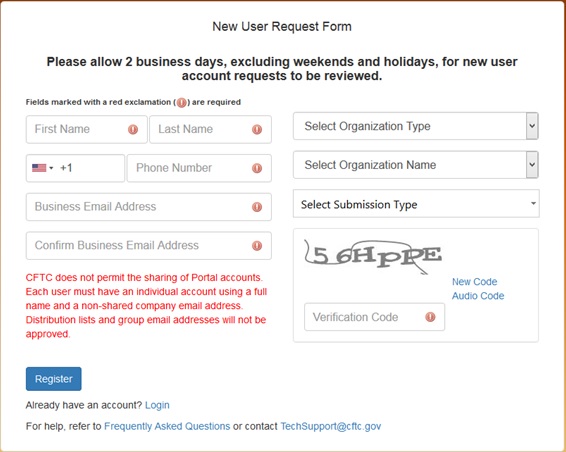
2. Complete Form 40 - You will receive an email notification from the CFTC once your Portal Account has been approved. Note that this approval may take up to 2 business days from the date you complete the New User Request Form. The email will contain a link to the Portal where you will be prompted to log in: https://portal.cftc.gov/
Instructions for completing the form are available at: https://www.ecfr.gov/cgi-bin/text-idx?node=ap17.1.18_106.a
Note that Portal provides the opportunity to save a copy of your submission in XML format, a recommended step, as this allows for uploading the file to the Portal should you need to make modifications at a later date. This will eliminate the need to renter the form in its entirety.
The CFTC will send a confirmation email upon successful completion of your Form 40.
3. Confirm with IBKR - forward your confirmation email, or other evidence that you have submitted the Form 40 to cftc_form40_filing@interactivebrokers.com. This will assist to ensure that your account is not subject to CFTC directed restrictions or fines.



